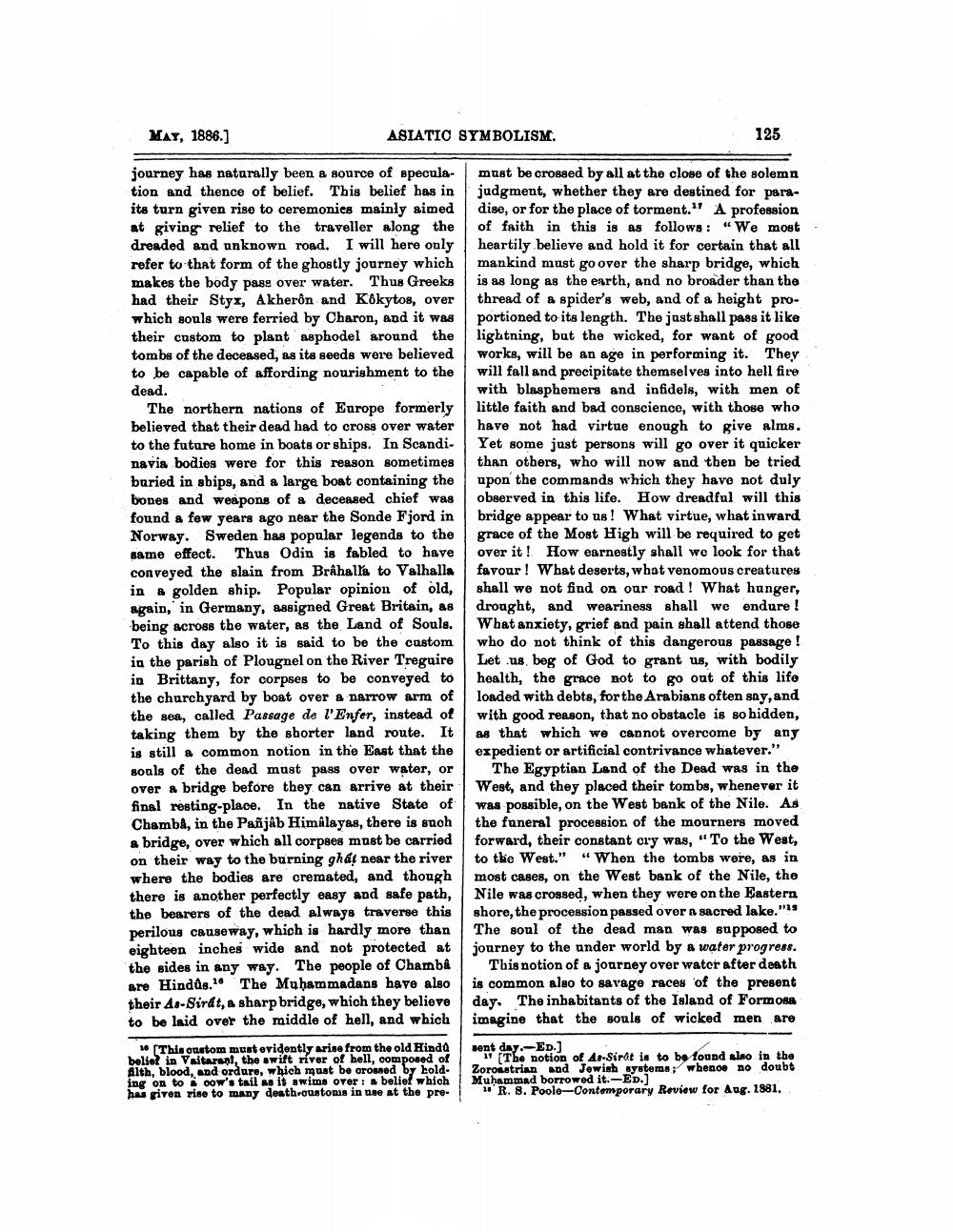________________
MAY, 1886.]
ASIATIC SYMBOLISM.
125
journey has naturally been a source of speculation and thence of belief. This belief has in its turn given rise to ceremonies mainly aimed at giving relief to the traveller along the dreaded and unknown road, I will here only refer to that form of the ghostly journey which makes the body pass over water. Thus Greeks had their Styx, Akherôn and Kokytos, over which souls were ferried by Charon, and it was their custom to plant asphodel around the tombs of the deceased, as its seeds were believed to be capable of affording nourishment to the dead.
The northern nations of Europe formerly believed that their dead bad to cross over water to the future home in boats or ships. In Scandi- navia bodies were for this reason sometimes buried in ships, and a large boat containing the bones and weapons of a deceased chief was found a few years ago near the Sonde Fjord in Norway, Sweden has popular legends to the same effect. Thus Odin is fabled to have conveyed the slain from Brahalla to Valhalla in a golden ship. Popular opinion of old, again, in Germany, assigned Great Britain, as being across the water, as the Land of Souls. To this day also it is said to be the custom in the parish of Plougnel on the River Treguire in Brittany, for corpses to be conveyed to the churchyard by boat over a narrow arm of the sea, called Passage de l'Enfer, instead of taking them by the shorter land route. It is still a common notion in the East that the Boals of the dead must pass over water, or over a bridge before they can arrive at their final resting-place. In the native State of Chamba, in the Pañjab Himalayas, there is such a bridge, over which all corpses must be carried on their way to the burning ghay near the river where the bodies are cremated, and though there is another perfectly easy and safe path, the bearers of the dead always traverse this perilous causeway, which is hardly more than eighteen inches wide and not protected at the sides in any way. The people of Chamba are Hindûs. The Muhammadans have also their As-Sirat, a sharp bridge, which they believe to be laid over the middle of hell, and which
must be crossed by all at the close of the solemn judgment, whether they are destined for paradise, or for the place of torment." A profession of faith in this is as follows: “We most heartily believe and hold it for certain that all mankind must go over the sharp bridge, which is as long as the earth, and no broader than the thread of a spider's web, and of a height proportioned to its length. The just shall pass it like lightning, but the wicked, for want of good works, will be an age in performing it. They will fall and precipitate themselves into hell fire with blasphemers and infidels, with men of little faith and bad conscience, with those who have not had virtue enough to give alms. Yet some just persons will go over it quicker than others, who will now and then be tried upon the commands which they have not duly observed in this life. How dreadful will this bridge appear to us! What virtue, what inward grace of the Most High will be required to get over it! How earnestly shall we look for that favour! What deserts, what venomous creatures shall we not find on our road! What hunger, drought, and weariness shall we endure ! What anxiety, grief and pain shall attend those who do not think of this dangerous passage ! Let .us, beg of God to grant us, with bodily health, the grace not to go out of this life loaded with debts, for the Arabians often say, and with good reason, that no obstacle is so hidden, as that which we cannot overcome by any expedient or artificial contrivance whatever."
The Egyptian Land of the Dead was in the West, and they placed their tombs, whenever it was possible, on the West bank of the Nile. As the funeral procession of the mourners moved forward, their constant cry was, "To the West, to the West." "When the tombs were, as in most cases, on the West bank of the Nile, the Nile was crossed, when they were on the Eastern shore, the procession passed over a sacred lake." The soul of the dead man was supposed to journey to the under world by a water progress.
This notion of a journey over water after death is common also to savage races of the present day. The inhabitants of the Island of Formosa imagine that the souls of wicked men are
10 This custom most evidently arise from the old Hindu beliel in Vaitarent, the swift river of hell, composed of Alth, blood, and ordure, which must be crossed by hold. ing on to soow's tail as it swims over: a belief which has given rise to many donthroustoma in ane at the pre-
sent day.-ED.)
11 The notion of Ar-Sirat is to be found also in the Zoroastrian and Jowish systems; whence no doubt Muhammad borrowed it.-ED.]
R. . Poolo-Contemporary Review for Aug. 1881.




